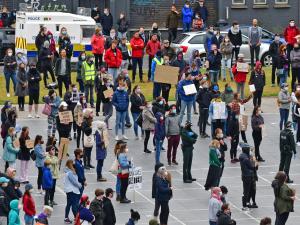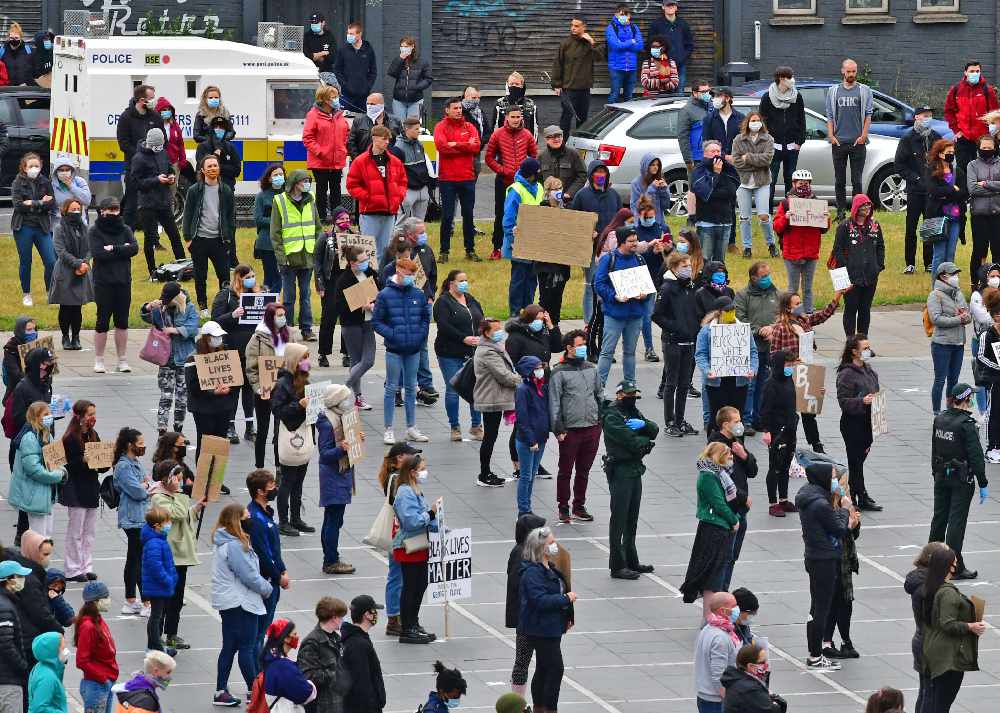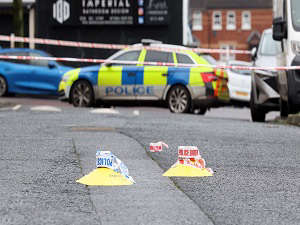
By David Young, PA
Black Lives Matters protesters are to sue the police after a watchdog found the force had been discriminatory in issuing fines to demonstrators.
Northern Ireland’s Police Ombudsman Marie Anderson said concerns around discriminatory police handling of the protests in June were justified.
Mrs Anderson said confidence in the Police Service of Northern Ireland among some within the black, Asian and minority ethnic communities in the region had been severely damaged by the incidents.
In response to the report, PSNI chief constable Simon Byrne said he was sorry that relations with those minority communities had been damaged and vowed to “put things right”.
A number of protesters who were interviewed under caution following the event are now issuing pre-action correspondence to the PSNI informing it of their intent to seek compensation for unlawful detention.
The demonstrators are also calling on police to rescind the fines handed out and repay the money.
They had already been pursing separate judicial review proceedings seeking a declaration that the PSNI actions were “unlawful”.

Ivanka Antova organised one of the protests at Custom House Square in Belfast.
“There is much in the Ombudsman’s report that speaks clearly to the unfair, disproportionate and discriminatory actions of the PSNI against peaceful BLM protesters,” she said.
“Institutional racism should not have been omitted in the report.
“Still, it strengthens the call for fines, cautions and reports for prosecution to be dropped. The PSNI and the political establishment in Northern Ireland must act now.”
Fellow demonstrator Sipho Sibanda, who spoke at the event, expressed disappointment that Mrs Anderson ruled out a racial motive behind the police actions.
“The policing of that event further tore our communities apart and motivated racism and racial attacks within our community,” she said.
“The chief constable has been forced to apologise and yet fines still stand and cautions still stand. It would be good to get a statement saying what the PSNI plan to do with those and to those that paid the fines. If we are building an equal society, then the people in the society should be treated equally and not beg for apologies.”
Protester Cuthbert Tura Arutura, who also addressed the Belfast rally, said police had to commit to change.
“We need to offer solutions and best practice, and ask how PSNI will implement them and a timeline,” he said.
Solicitor Darragh Mackin, who represents the protesters, said the police actions “rode a cart and horses” through his clients’ human rights.
“We now have been instructed to take formal steps for the recovery of the fines in question and for damages for the unlawful detentions that ensued as a result of the police actions,” he confirmed.
The PSNI faced criticism in the summer after handing out Covid regulation breach fine to participants in the protests. They faced scrutiny as to why penalties had been issued at those events while other gatherings in apparent breach of regulations did not witness similar police action.
The Ombudsman specifically examined contrasting police approaches at Black Lives Matters protests in Belfast and Londonderry on June 6, when fines were handed out, and a Protect our Monuments counter-protest in Belfast a week later – an event that saw no penalties issued.
The protests and counter demonstration were similar to events held around the world following the death in May of George Floyd, a black man who died while being restrained by police in the US city of Minneapolis.
In a 90-page report, Mrs Anderson said claims PSNI actions amounted to unfairness and discrimination were justified.
However, she said she believed this was not intentional and not based on race or ethnicity.
The Ombudsman said the situation had arisen due to a “failure” by police to fully understand their human rights obligations.
Mrs Anderson has made a number of recommendations which included that in future police consider adopting a human rights-based approach to the policing of protests, which would involve balancing competing rights and risks.
She also said police should consider redress for those singled out for fines.
Last month, the PSNI’s oversight body – the Policing Board – questioned whether the organisation’s approach to the Black Lives Matter protests was “unlawful” and if the issuing of fines to participants took due consideration of their right to protest.
In response to the Ombudsman’s report, the chief constable said it was clear some minority groups had been left “frustrated, angry and upset” by the police’s handling of the events.
“For that I am sorry, and I am determined in that regard to put things right,” he said.


 Education Authority boss hits out at criticisms of public services
Education Authority boss hits out at criticisms of public services
 Man in 90s dies following Co Down road crash
Man in 90s dies following Co Down road crash
 Police to increase patrols after second incident of shots being fired in Belfast
Police to increase patrols after second incident of shots being fired in Belfast
 Woman charged over theft of campaigner’s car ‘must stay out of Belfast’
Woman charged over theft of campaigner’s car ‘must stay out of Belfast’
 Bluetongue restrictions in Northern Ireland will be relaxed from Friday
Bluetongue restrictions in Northern Ireland will be relaxed from Friday